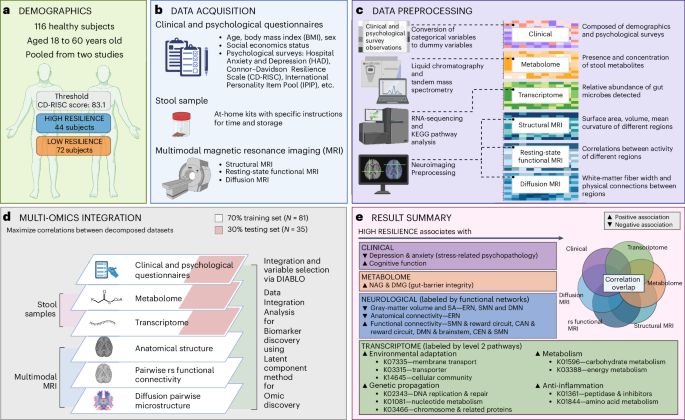
Title: Resilience and the Brain-Gut Connection: A New Study Reveals Insights
A new study published in Nature Mental Health has shed light on the connection between resilience, brain function, and gut health. The research, led by Arpana Gupta from UCLA's Goodman-Luskin Microbiome Center, is believed to be the first of its kind to explore this intersection.
The study involved 116 participants who were surveyed about their resilience levels and divided into two groups: one with high resilience and one with low. Participants provided stool samples for gut microbiome analysis and underwent MRI brain scans to assess neural activity in regions associated with emotional regulation, cognition, and stress response.
The findings revealed that individuals who scored high on the resilience scale exhibited improved brain function, including better emotional regulation and cognitive abilities. Additionally, their gut microbiomes showed reduced inflammation and stronger gut barriers compared to those in the low-resilience group.
Gupta explained that this study highlights resilience as a whole-body phenomenon affecting both brain and gut health. The researchers believe that understanding the mechanisms behind resilient individuals' improved brain function and healthy gut microbiomes could lead to new treatments targeting both areas to reduce stress and prevent disease.
The research builds on previous studies linking the composition and function of the microbiome to stress-related disorders and other mental health diagnoses. The findings also support the idea that resilient people are better at regulating their emotions, less likely to catastrophize, and keep a level head during stressful situations.
The study's implications extend beyond individual wellbeing. By identifying the specific gut microbiome traits associated with resilience, researchers may be able to develop targeted interventions to boost resilience in individuals who are at risk for developing stress-related disorders or other mental health conditions.
Sources:
- UCLA Newsroom - 'Resilient individuals show improved brain function and healthier gut microbiomes'
- Nature Mental Health - 'Brain-gut microbiome interactions in relation to psychological wellbeing'
- Arpana Gupta's Lab Website


